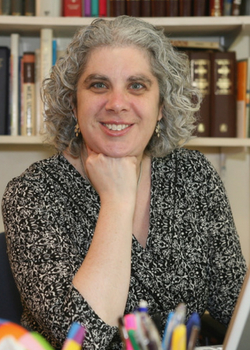The first verse of the parashah, Gen. 23:1, tells us (following the translation in Etz Hayim): "Sarah's lifetime - the span of Sarah's life - came to one hundred and twenty-seven years." There is a rather strange little midrash that appears in Bereshit Rabbah regarding Sarah's death, and more particularly her advanced age the time of her death:
Rabbi Akiva was sitting and lecturing, and the assembled people were becoming drowsy. He sought to stir them up. He said, "What was the reason that Esther merited to rule over 127 provinces? [see Esther 1:1]? Let Esther, daughter's daughter of Sarah who was 127, come and rule over 127 provinces!"
Certainly, there's humor in this scene - Rabbi Akiva, the great Rabbi Akiva, can't keep the attention of his audience! Who among us who has ever taught a class, or presented a drash, or given a speech, can't identify? We understand his impulse to say something that will surprise his audience and recapture their interest. But why this? What's so shocking about connecting Sarah's 127 years of life to the 127 provinces over which Esther ruled as queen to Ahashueros?
After all, this is not the only thing that connects Sarah and Esther. Both are among the seven women whom the rabbis counted as prophets in the Talmud, Megillah 14a (for the curious, the full list is Sarah, Miriam, Deborah, Hannah, Abigail, Huldah, and Esther). Midrash Hagadol suggests that Proverbs 31:10-31, the famous "Woman of Valor" passage, praises 22 women from biblical history, one for each verse; of course both Sarah and Esther are on the list (see Louis Ginzberg's Legends of the Jews, vol. V, p. 258, note 271). One might even note that both spent time in the court of powerful king/pharaoh, and thereby greatly benefited the fortunes of the Jewish men in their lives.
The only answer I can come to for why this midrash would surprise and arouse Rabbi Akiva's audience, frankly, is because it involves women. The concept of zechut avot, the merit of the ancestors, is well-entrenched in Jewish tradition. This concept claims that even when we are unworthy and rebellious, we have some merit with God because of our ancestors and their loyalty. But it is perhaps worthwhile to ask if it is really accurate to translate "avot" as "ancestors," as we frequently do in our desire for inclusiveness. It is true that in Hebrew a masculine plural noun like "avot" can be used to refer to a group of mixed gender, but "avot" here is much like what "men" once was in common English usage; women might be included, but one got the sense that often they really weren't. Again and again in Torah, the merits of and Divine promises to the Patriarchs of our tradition are recalled. The names Abraham, Isaac, and Jacob (or Israel) appear together in the latter four books of Torah 18 times (and once in Gen. 50; also once each in I Kings, II Kings, and First Chronicles). Particularly striking is Deut. 9:27, in which Moses recalls his pleading before God not to destroy the people after the sin of the Golden Calf: "Give thought to Your servants, Abraham, Isaac, and Jacob, and pay no heed to the stubbornness of this people, its wickedness, and its sinfulness." Until very recent times, Jews prayed to "the God of Abraham, the God of Isaac, the God of Jacob," echoing the way in which God self-identifies to Moses in Ex. 3:6, with no mention of the Matriarchs.
Rabbi Akiva's midrash is indeed radical for its time, and perhaps even for ours. It is a reminder that our Matriarchs and our mothers bestow merit on us, their children and children's children. A Jewish woman in Persia after the destruction of the first Temple may need, and receive, the merit of her foremother, the first Jewish woman. All Jews today may call on the merit of their mothers and foremothers, be they Sarah Imenu, or our own individual mothers, living and dead. May it be God's will that when we need that merit, that like Esther, we will receive it.
Shabbat Shalom.

